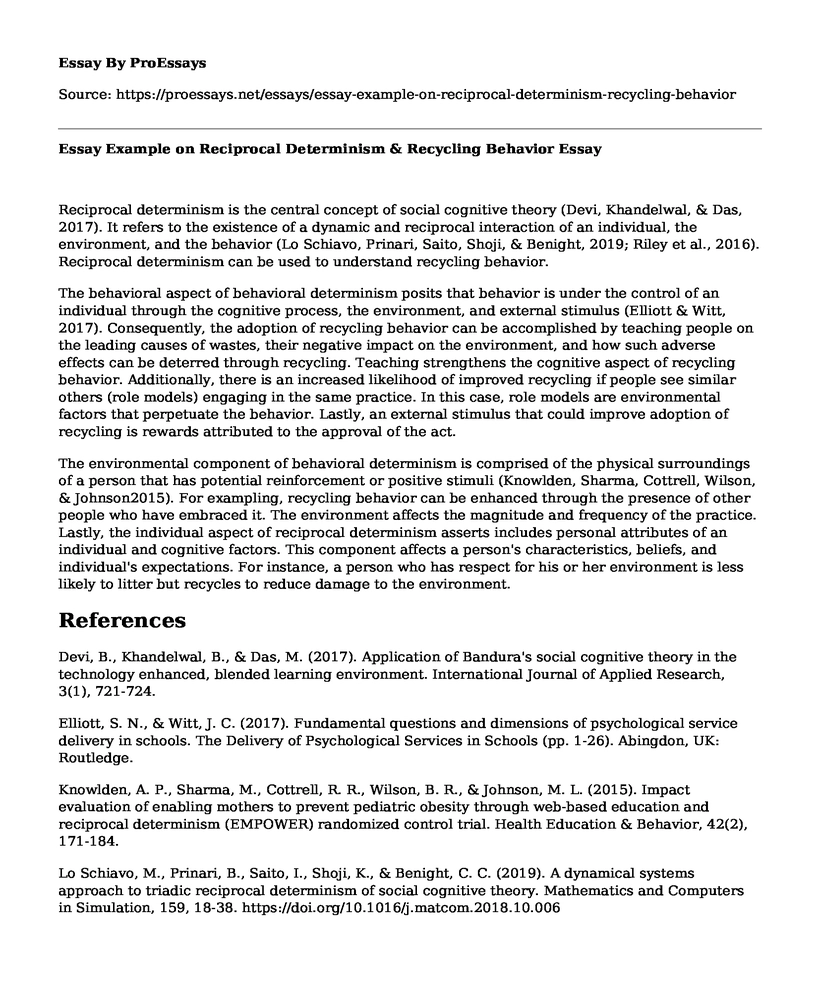Reciprocal determinism is the central concept of social cognitive theory (Devi, Khandelwal, & Das, 2017). It refers to the existence of a dynamic and reciprocal interaction of an individual, the environment, and the behavior (Lo Schiavo, Prinari, Saito, Shoji, & Benight, 2019; Riley et al., 2016). Reciprocal determinism can be used to understand recycling behavior.
The behavioral aspect of behavioral determinism posits that behavior is under the control of an individual through the cognitive process, the environment, and external stimulus (Elliott & Witt, 2017). Consequently, the adoption of recycling behavior can be accomplished by teaching people on the leading causes of wastes, their negative impact on the environment, and how such adverse effects can be deterred through recycling. Teaching strengthens the cognitive aspect of recycling behavior. Additionally, there is an increased likelihood of improved recycling if people see similar others (role models) engaging in the same practice. In this case, role models are environmental factors that perpetuate the behavior. Lastly, an external stimulus that could improve adoption of recycling is rewards attributed to the approval of the act.
The environmental component of behavioral determinism is comprised of the physical surroundings of a person that has potential reinforcement or positive stimuli (Knowlden, Sharma, Cottrell, Wilson, & Johnson2015). For exampling, recycling behavior can be enhanced through the presence of other people who have embraced it. The environment affects the magnitude and frequency of the practice. Lastly, the individual aspect of reciprocal determinism asserts includes personal attributes of an individual and cognitive factors. This component affects a person's characteristics, beliefs, and individual's expectations. For instance, a person who has respect for his or her environment is less likely to litter but recycles to reduce damage to the environment.
References
Devi, B., Khandelwal, B., & Das, M. (2017). Application of Bandura's social cognitive theory in the technology enhanced, blended learning environment. International Journal of Applied Research, 3(1), 721-724.
Elliott, S. N., & Witt, J. C. (2017). Fundamental questions and dimensions of psychological service delivery in schools. The Delivery of Psychological Services in Schools (pp. 1-26). Abingdon, UK: Routledge.
Knowlden, A. P., Sharma, M., Cottrell, R. R., Wilson, B. R., & Johnson, M. L. (2015). Impact evaluation of enabling mothers to prevent pediatric obesity through web-based education and reciprocal determinism (EMPOWER) randomized control trial. Health Education & Behavior, 42(2), 171-184.
Lo Schiavo, M., Prinari, B., Saito, I., Shoji, K., & Benight, C. C. (2019). A dynamical systems approach to triadic reciprocal determinism of social cognitive theory. Mathematics and Computers in Simulation, 159, 18-38. https://doi.org/10.1016/j.matcom.2018.10.006
Riley, W. T., Martin, C. A., Rivera, D. E., Hekler, E. B., Adams, M. A., Buman, M. P., Pavel, M., & King, A. C. (2016). Development of a dynamic computational model of social cognitive theory. Translational Behavioral Medicine, 6(4), 483-495. https://doi.org/10.1007/s13142-015-0356-6
Cite this page
Essay Example on Reciprocal Determinism & Recycling Behavior. (2023, Mar 26). Retrieved from https://proessays.net/essays/essay-example-on-reciprocal-determinism-recycling-behavior
If you are the original author of this essay and no longer wish to have it published on the ProEssays website, please click below to request its removal:
- Ethical Standards to Obtain Ethics Approval
- Wisdom Is Pursued: Socrates and Oracle Paper Example
- Prudent Decision-Making Paper Example
- Assistive Technologies for Children With Disabilities: Evidence-Based Strategy for Inclusion and Education
- Essay Sample on Aristotle's Theory of Causes: An Overview and Critique
- Free Will: A Contested Concept in Human Lives
- Essay Example on Team-Based Learning: A Constructivist Approach







